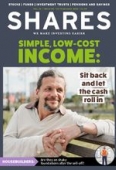Archived article
Please note that tax, investment, pension and ISA rules can change and the information and any views contained in this article may now be inaccurate.
Fundsmith late to Alphabet and Amazon party but still no S&P 500 tracker

Terry Smith might be Britain’s favourite fund manager. Having built up an army of retail investor fans with his flagship Fundsmith Equity (B41YBW7) vehicle, he is often compared to Warren Buffett, such is his laser focus on a deceptively simple three-point investment strategy; buy good companies, don’t overpay, do nothing.
But it’s been a tough start to 2022 for Fundsmith, with two of its largest stakes – PayPal and Meta Platforms, better known as Facebook, plunging 24% and 26% respectively last week on lacklustre quarterly results and downbeat commentary. Meta’s collapse slashed $230 billion off its market valuation, the biggest one-day loss for a US company by miles.
‘PayPal’s performance last year was a clear exception to the benefits of running winners,’ said Smith in his January 2022 annual letter to shareholders.
‘The shares performed poorly amid concerns that its ambitions to construct a “super app” to drive users to its payment systems might involve some value destruction, brought home by its apparent interest in acquiring social media operator Pinterest. We may be wrong but we would prefer if PayPal stuck to its knitting,’ said Smith.
BIG TECH BETS
Fundsmith’s big tech bets in recent months might draw some to conclude that it is increasingly aligning itself with the S&P 500’s biggest companies, eroding its ability to maintain its benchmark beating performance.
Since inception in November 2010, returns have been spectacular, up 506.9% to 31 January 2022, or put another way, averaging 17.4% a year. The MSCI World index delivered equivalent 270.1% and 12.3% a year figures.
Little wonder Fundsmith Equity has pulled in investors in their droves, with just shy of £26.2 billion under management as of 3 February 2022, according to Trustnet data, making it one of, if not the most popular UK actively managed open-ended fund.
Yet in its latest January 2022 factsheet, the manager announced that he had bought a stake in Google-parent Alphabet, the first time the fund has owned the stock, alongside hints of stakebuilding in two other unnamed companies.
The Alphabet bet came just a few months after Smith built up a position in ecommerce giant Amazon. That purchase caught many by surprise, as Smith had refused to own the stock for years and had only months previously attacked the company as being ‘barely profitable’ without its Amazon Web Services cloud business.
Addressing the attention attracted by its Amazon investment, Smith quoted the economist and successful fund manager John Maynard Keynes, who said ‘When the facts change, I change my mind.’ It could be explained by the simpler aphorism, said Smith – Better late than never – ‘or at least it will be if our purchase delivers the performance we expect’.
Microsoft is the fund’s largest single stake, and with Meta and now Amazon and Alphabet, that’s four of the S&P 500’s five biggest companies now in the portfolio.
ANALYST-BACKED APPROACH
But analysts dismiss any tracker talk. ‘Terry Smith follows a simple, well-defined investment style that focuses on high-quality, free cash flow generative businesses,’ said Daniel Haydon, Morningstar research analyst.
‘That a new position in Alphabet has been completed simply shows that it now meets his strict investment criteria. The company now throws off more free cash flow than ever, thanks in large part to the curtailing of loss-making other bets made by the company.
‘He tolerates the currently loss-making cloud computing operation due to secular growth trends in that area, and over the longer term expects it to become a useful source of returns,’ Haydon said.
AJ Bell head of investment research Ryan Hughes says: ‘The compounding power of these companies continues to be underappreciated by many investors and they are both in such dominant positions that their earnings power should remain phenomenal. Amazon putting through a 17% increase in the cost of Prime shows how they have the ability to push costs onto the customer and as their services have become embedded in every day life. This plays well to the Fundsmith ethos and therefore while they are late to the party, it could potentially be that the party is actually only really just getting going.’
Yet the timing of Smith’s Amazon purchase, and its ongoing holdings in Meta and PayPal, are at odds with the Blue Whale Growth Fund (BD6PG78), often compared to Fundsmith because of their similar investment ethos.
Blue Whale, run by Stephen Yiu, ditched its Amazon stake in December 2021, prompted by concerns over rising competition affecting the retail business and the longer-term outlook for AWS.
Amazon had been a feature in the Blue Whale fund since it was set up in 2017.
‘In addition to our Amazon exit in 2021, we’ve also sold out of PayPal and Facebook (Meta) before their “ugly” results, which were both held in the fund since inception in September 2017,’ Yiu told Shares .
Differences of opinion about individual company prospects and valuations is what makes a market. Perhaps Fundsmith will be proven right on the above companies, maybe Blue Whale will, only time will tell. But what investors can be assured of is that both will continue to hunt for high quality investment opportunities over the longer-run.
Fundsmith prospered during the pandemic because it invests in companies that are capable of enduring big events and changes. As Smith concluded in his annual letter, ‘they will probably survive whatever comes next and so will we if we stick to our principles and we have every intention of doing so’.
DISCLAIMER: The author (Steven Frazer) has a personal investment in Fundsmith and Blue Whale referenced in this article. AJ Bell is the owner and publisher of Shares magazine. Steven Frazer and the editor of this article (Tom Sieber) own shares in AJ Bell.
Important information:
These articles are provided by Shares magazine which is published by AJ Bell Media, a part of AJ Bell. Shares is not written by AJ Bell.
Shares is provided for your general information and use and is not a personal recommendation to invest. It is not intended to be relied upon by you in making or not making any investment decisions. The investments referred to in these articles will not be suitable for all investors. If in doubt please seek appropriate independent financial advice.
Investors acting on the information in these articles do so at their own risk and AJ Bell Media and its staff do not accept liability for losses suffered by investors as a result of their investment decisions.
Issue contents
Editor's View
Feature
Great Ideas
- Google-owner does the splits as it smashes Q4 expectations
- Grab a great buying opportunity in Gamma Communications
- Pets At Home's new CEO is a great hire and the shares are still a buy
- Our buy call on Shell is up nearly 20% in two weeks
- Take advantage of Smithson’s stumble and top up
- Virgin Wines’ share price slump looks overdone
- This value-tilted global fund is now outperforming

 magazine
magazine









